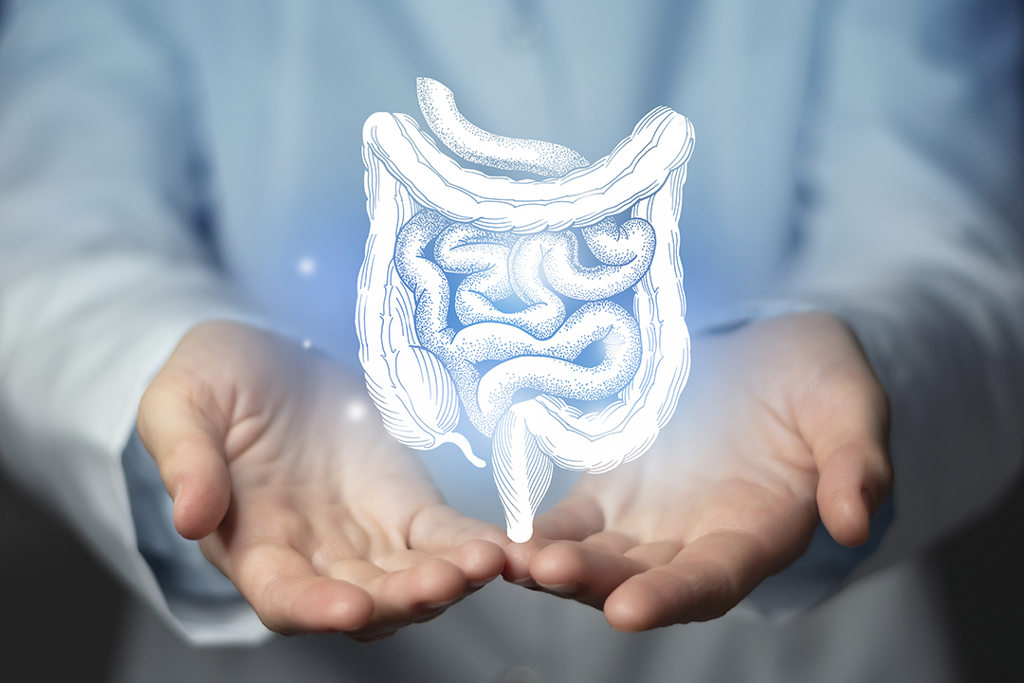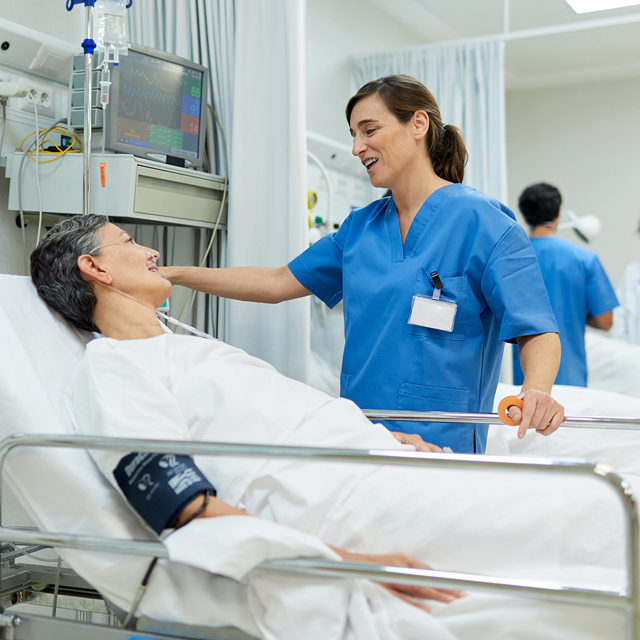
Colon Cancer Screening
There are several tests and procedures to screen for colon cancer, but the gold standard recommended by most GI doctors is the colonoscopy. A colonoscopy is an outpatient procedure performed while you are asleep that allows the gastroenterologist to inspect the inside of your colon (large intestine) for signs of cancer. A colonoscopy is the only cancer screening available that can also prevent cancer by finding and removing polyps before they become cancerous. According to the American Cancer Society, colonoscopies reduce the number of deaths caused by colorectal cancer by 60% and colorectal cancer occurrence by 40%. Colorectal cancers are the second leading cause of death in the US.
Colon cancer is one of the most treatable forms of cancer. Could you be at risk? Take our short quiz. It only takes five minutes!
How is a Colonoscopy Performed?
During a colonoscopy, your stomach doctor examines the large intestine via a small tube and camera that is inserted through your anus while you are sedated. The gastroenterologist will remove any polyps detected during the procedure to inspect for colon cancer. If the polyps are not cancerous, removing them helps prevent them from developing into colon cancer. Tests to determine if cancer is present, called biopsies, are sent to a pathologist for review and results are returned in roughly 1-2 weeks.
The actual colonoscopy procedure typically takes 15-30 minutes. However, with pre- and post-surgery prep, you can expect to spend about 2-3 hours at the outpatient facility for your colonoscopy. When you arrive at the facility, you will go through admissions, meet with your GI doctor to ask any final questions about the procedure, and have an IV placed which will be used to administer the sedative. After your colonoscopy, you will be observed until the anesthesia wears off.
Patients may feel groggy, tired, or nauseous from the anesthesia after a colonoscopy. Slight irritation to the anus and rectum from the prep or procedure may be present. Temporary light cramping or bleeding may also occur, but anything severe is rare and should be addressed immediately. Your gastroenterology team will give you instructions on what to watch for.
Because you will be under anesthesia for your colonoscopy, you must have someone with you to accompany you home after the procedure (even if you take public transportation or a ride share home). This person can also be helpful in ensuring you have all the information before and after the procedure and should stay with you for the remainder of the day in case you have any side effects from the procedure or anesthesia.
Colonoscopies are performed as outpatient procedures at any Penn Highlands Healthcare hospital, the Endoscopy Center in DuBois, and our GI Lab at Penn Highlands DuBois West.
Is a Colonoscopy Painful?
No, colonoscopies are not painful. In fact, because you are sedated, you won’t feel anything and you won’t remember the procedure. If you’ve heard people talk about them with dread, it’s usually due to the preparation, which is explained below. However, new medications are making prep easier than in the past.
What is the Best Way to Prep for a Colonoscopy?
Before a colonoscopy, your GI doctor will give you specific instructions to prepare for a colonoscopy. You will likely be asked to start on a low-fiber diet a few days before the procedure. You’ll then be on a clear liquid diet the day before the procedure. At this time, you will take a prescribed laxative that you will pick up at a pharmacy to purge your colon.
Traditional colonoscopy prep liquid laxatives like polyethylene glycol and ascorbate preparation (PEG-EA) are prescribed in two large liquid doses—one that must be drunk the afternoon or evening before the procedure, and the second half typically 4-5 hours before the procedure. You should mix the laxative as directed in the prescription. You will need to drink 8 ounces every 10-15 minutes and should drink it quickly rather than sip it. It will likely take you 2 hours to drink one portion (half) of the liquid laxative.
As of November 2020, a new tablet preparation for colonoscopy, SUTAB, was approved by the FDA. Taken in two doses the evening prior to the procedure, the sulfate-based tablet was found to be as safe and effective as traditional liquid laxatives like PEG-EA. Patients in the clinical trial also rated their experience with the tablet more favorably than the traditional liquid bowel prep.
Who should get a Colonoscopy?
The American Cancer Society recommends that people of average risk for colorectal cancer should have their first colonoscopy starting at age 45. You are considered average risk for colorectal cancer if you:
- Do not have a personal history of polyps, colorectal cancer, inflammatory bowel disease, or of a prior cancer that required getting radiation to the abdomen or pelvic area
- Do not have a family history of colorectal cancer
- Do not have confirmed or suspected hereditary colorectal cancer syndrome
If your gastroenterologist does not find any polyps or have any concerns during your first colonoscopy, most people only need to repeat the procedure every 10 years. People 75 and older should consult with your physician about the benefits and risks of colonoscopy.
Are Colonoscopies in Pennsylvania free?
Whether or not you will have to pay anything for your colonoscopy depends on whether it is being performed as a screening test or a diagnostic test:
Screening Colonoscopy: A screening colonoscopy is performed to screen for colon cancer on patients who do not have any symptoms or indicators of colon cancer. If you qualify for a screening colonoscopy screening based on age and risk factors, it is covered by your insurance plan, Medicare and Medicaid as an essential health benefit under the Affordable Care Act (“Obama Care”) that must be completely paid by any health plan without you owing a copay, coinsurance, or meeting a deductible. However, different health plans use different guidelines as to when and what type of screenings are covered, so you should check with your insurance to make sure you meet their requirements.
Diagnostic Colonoscopy: Your doctor may prescribe a colonoscopy to help diagnose a health condition causing symptoms such as unexplained gastrointestinal issuing, bleeding in the stool, or other symptoms. If performed as a diagnostic test, colonoscopies are typically paid for by your health insurance, Medicare and Medicaid, but standard deductibles and copays will apply.
If you do not have insurance, you can expect to pay between $1,300-$2,700 for a colonoscopy in Pennsylvania.
Are Colonoscopies Safe?
Colonoscopy is considered a safe procedure. Most patients find the prep for a colonoscopy to be more burdensome than the actual procedure. Colonoscopies provide both cancer screening and cancer prevention as many times GI doctors are able to remove polyps through a colonoscopy before they develop into cancerous problems. While no procedure that requires anesthesia, like a colonoscopy, is 100% safe, the benefits of a colonoscopy compared to the risks of not having the procedure are considerable.
Risks associated with colonoscopy are low but include infection, perforated intestine, bleeding, adverse reaction to the anesthesia, and, in rare cases, post-polypectomy electrocoagulation syndrome. People who are older than 75 may have more risks associated with colonoscopy and should weigh the risks to the benefits.
Risks and quality of colonoscopies have been directly tied to the outpatient facility where you get your colonoscopy.
Where can I get a Colonoscopy in Pennsylvania?
To receive a colonoscopy in Pennsylvania, you can choose between outpatient surgical centers and hospitals, based on your location and preference. Penn Highlands Healthcare’s Endoscopy Center in DuBois provides top quality endoscopy procedures including colonoscopy for patients in western and central Pennsylvania. Penn Highlands gastroenterologists also perform expert colonoscopies at our GI lab at Penn Highlands DuBois West and all other Penn Highlands Hospitals.


